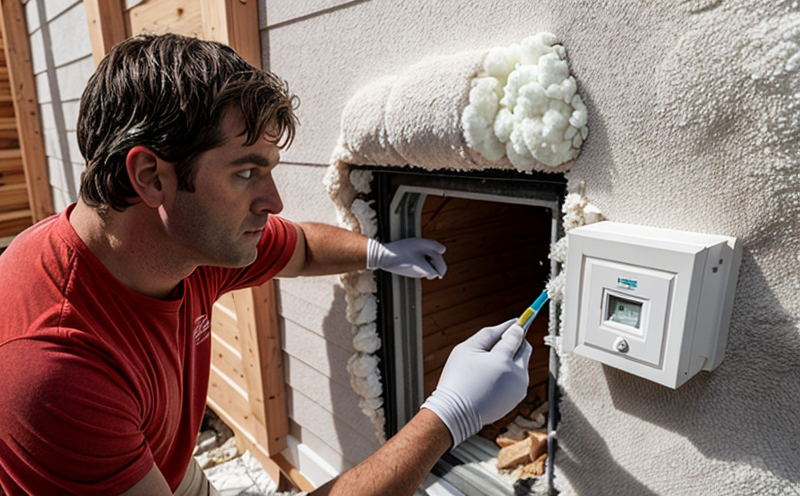ISO 12086 Thermal Resistance of Flexible Insulation
The ISO 12086 standard is a cornerstone in the realm of building and infrastructure testing, particularly when it comes to assessing the thermal performance of flexible insulation materials. This test method provides a standardized procedure for measuring the thermal resistance (R-value) of these materials using a guarded hot plate apparatus. The R-value, or thermal conductivity, is a critical metric that determines how well an insulation material resists heat flow and maintains energy efficiency in buildings.
Thermal resistance testing under ISO 12086 ensures compliance with international standards for quality assurance and quality control in the construction sector. This test is especially important when evaluating materials like polyethylene foams, polystyrene foams, and other flexible insulations that are used extensively in building envelopes, roofs, and walls.
The procedure involves placing a specimen of the insulation material between two parallel plates. One plate is maintained at a specified temperature (typically higher than the ambient), while the other is kept at a lower temperature. A controlled heat flow is then applied through the specimen, and the thermal resistance is calculated based on the measured temperatures and heat flux.
The accuracy of this test method is crucial for ensuring that insulation materials meet energy efficiency requirements set by building codes and standards such as ASHRAE, EN 12086-4, and others. Misalignment in testing can lead to significant discrepancies in R-values, which could result in suboptimal performance during actual installation.
For instance, if a material is installed in a cold climate region but tested under different conditions, the measured R-value may not accurately reflect its true thermal resistance when used in that specific location. This underscores the importance of controlled testing environments and standardized methods like ISO 12086.
In summary, the ISO 12086 thermal resistance test is a vital tool for ensuring that flexible insulations perform as expected under real-world conditions. It provides manufacturers, architects, and engineers with reliable data to make informed decisions about material selection and design optimization. By adhering to this standard, stakeholders can contribute to energy-efficient buildings, reduced carbon footprints, and better indoor comfort.
Why It Matters
The thermal resistance of flexible insulation materials is a key factor in determining the overall energy efficiency of buildings. Properly insulated structures help reduce heating and cooling costs while minimizing environmental impact. The ISO 12086 test ensures that the material’s performance aligns with international standards, thereby facilitating compliance with regulatory requirements.
From an economic perspective, accurate thermal resistance measurements can prevent wasted energy due to poor insulation choices. From a sustainability standpoint, it supports efforts to reduce carbon emissions by promoting more efficient building practices. Compliance with ISO 12086 also enhances the reputation of manufacturers and suppliers who adhere to these rigorous testing protocols.
In addition to cost savings and environmental benefits, reliable thermal resistance data is essential for ensuring product quality. It allows manufacturers to identify potential issues in their production processes early on, leading to improvements that enhance product performance and durability. This can translate into longer-lasting products with better long-term value for end-users.
Furthermore, ISO 12086 testing helps bridge the gap between theoretical specifications and practical applications. By providing consistent results across different environments and conditions, it supports the development of more versatile and adaptable insulation solutions that perform well in diverse climates and construction contexts.
Industry Applications
The ISO 12086 thermal resistance test finds extensive use in various sectors, particularly those involved in building and infrastructure projects. Here are some key applications:
- Commercial Buildings: Ensuring that insulation materials used in office spaces, retail stores, and other commercial settings meet stringent energy efficiency standards.
- Residential Housing: Evaluating the thermal performance of insulating materials utilized in homes to enhance comfort levels and reduce energy consumption.
- Industrial Facilities: Assessing insulation used in large-scale manufacturing plants where maintaining optimal operating temperatures is crucial for productivity.
| Industry | Purpose of Testing | Key Benefits |
|---|---|---|
| Manufacturing | Evaluating the efficiency of insulating materials in production environments | Achieving consistent product quality and operational reliability |
| Retail | Sustaining energy-efficient practices for improved customer satisfaction | Enhancing brand reputation through sustainable initiatives |
| Healthcare | Maintaining controlled temperature conditions in patient care areas | Improving patient outcomes and staff comfort |
The test results are invaluable for quality managers, compliance officers, R&D engineers, and procurement teams who rely on accurate data to make informed decisions. The standardized nature of ISO 12086 ensures consistency across different testing facilities, making it easier to compare results and ensure compliance with international standards.
Eurolab Advantages
At Eurolab, we pride ourselves on offering comprehensive services that meet the highest standards of accuracy and reliability. Our expertise in ISO 12086 thermal resistance testing is backed by years of experience and cutting-edge facilities:
- Precision Instruments: Utilizing state-of-the-art guarded hot plate apparatus to ensure precise measurements.
- Experienced Staff: A team of experts with extensive knowledge in insulation materials and thermal performance testing.
- Comprehensive Reporting: Providing detailed reports that include raw data, analysis, and recommendations for improvement.
- Regulatory Compliance: Ensuring that all tests comply with international standards such as ISO 12086-4 and ASHRAE guidelines.
We understand the importance of trust in testing results. Our commitment to accuracy, transparency, and reliability has made us a preferred partner for many leading companies in the building and infrastructure sectors. Whether you need routine quality checks or one-off compliance assessments, Eurolab is equipped to deliver exceptional service tailored to your specific needs.





